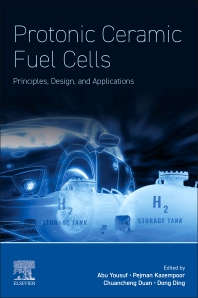Books in Hydrogen energy and fuel cells
Books in Hydrogen energy and fuel cells

Protonic Ceramic Fuel Cells
Principles, Design, and Applications- 1st Edition
- September 1, 2026
- Abu Yousuf + 3 more
- English

Energy Storage and Hydrogen Integration for Sustainable Solutions
- 1st Edition
- September 1, 2026
- Mousa Marzband + 1 more
- English

Decarbonizing through Sustainable Hydrogen and its Derivatives
- 1st Edition
- August 1, 2026
- Asmae Berrada + 1 more
- English

Alkaline Fuel Cells
Fundamentals, Design, and Applications- 1st Edition
- July 1, 2026
- Liang An + 2 more
- English

Biohydrogen
Advances in Theory and Production- 1st Edition
- July 1, 2026
- Danping Jiang + 2 more
- English

Hydrogen and Bioenergy
Synergies for a Renewable Energy Future- 1st Edition
- April 24, 2026
- Petronilla Fragiacomo + 3 more
- English

Solid Oxide Fuel Cells Science and Engineering
Fundamentals, Materials, and Technologies- 1st Edition
- April 1, 2026
- Kongfa Chen + 2 more
- English

Hydrogen Fuel Cell Electric Vehicles
Fundamentals, Design, Performance, Applications, and AI-Driven Commercialization- 1st Edition
- March 9, 2026
- Morteza Nazari-Heris + 2 more
- English

Green Hydrogen Generation from Biomass
- 1st Edition
- February 10, 2026
- Yasser Vasseghian + 2 more
- English

PEM Fuel Cells Performance
Simulation and Optimization by AI- 1st Edition
- December 3, 2025
- Mehrzad Shams + 1 more
- English